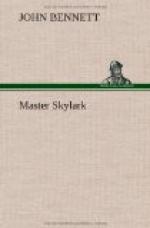Yet, be his temper what it might, he was but one thing always to Cicely, and doffed ill humor like a shabby hat when she came running to meet him in the shadows of the hall; so that when he came into the lighted room, with her upon his shoulder, his face was smiles, his step a frolic, and his bearing that of a happy boy.
But day by day the weather grew worse, with snow and ice paving the streets with a glassy glare and choking the frozen drains; and there was trouble and want among the poor in the wretched alleys near Carew’s house: for fuel was high and food scarce, and there were many deaths, so that the knell was tolling constantly.
Cicely cried until her eyes were red for the very sadness of it all, since she might do nothing for them, and hated the sound of the sullen bell.
“Pshaw, Cicely!” said Nick; “why should ye cry? Ye do na know them; so ye need na care.”
“But, Nick,” said she, “nobody seems to care! And, sure, somebody ought to care; for it may be some one’s mother that is dead.”
At that Nick felt a very queer choking in his own throat, and did not rest quite easy in his mind until he had given the silver buckle from his cloak to a boy who stood crying with cold and hunger in the street, and begged a farthing of him for the love of the good God.
Then came a thaw, with mist and fog so thick that people were lost in their own streets, and knocked at their next-door neighbor’s gate to ask the way home. All day long, down by the Thames drums beat upon the wharves and bells ding-donged to guide the watermen ashore; but most of those who needs must fare abroad went over London Bridge, because there, although they might in no wise see, it felt, at least, as if the world were still beneath their feet.
At noon the air was muddy brown, with a bitter taste like watered smoke; at night it was a blinding pall; and though, after mid-December, by order of the Council, every alderman and burgess hung a light before his door, torches, links, and candles only sputtered feebly in the gloom, of no more use than jack-o’-lanterns gone astray, and none but blind men knew the roads.
The city watch was doubled everywhere; and all night long their shouts went up and down—“’Tis what o’clock, and a foggy night!”—and right and left their hurrying staves came thumping helplessly along the walls to answer cries of “Murder!” and of “Help! Watch! Help!” For under cover of the fog great gangs of thieves came down from Hampstead Heath, and robberies were done in the most frequented thoroughfares, between the very lights set up by the corporation; so that it was dangerous to go about save armed and wary as a cat in a crowd.




